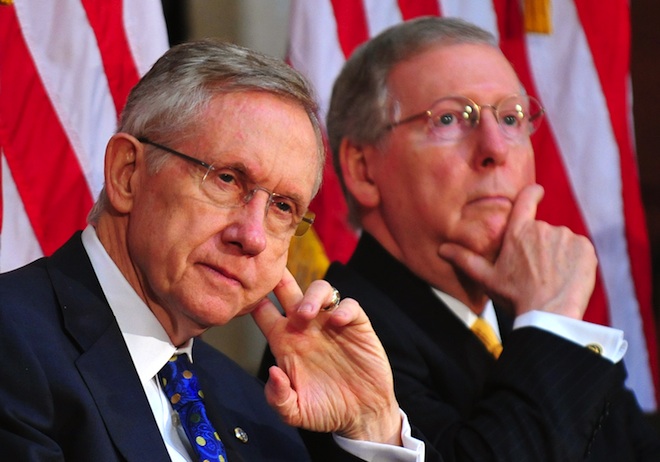Now that House Republicans have taken the debt limit out of the realm of legislative horse trading, we have a clearer sense of how upcoming negotiations over the remaining fiscal issues dividing the parties will play out.
Though the threat of a debt default is off the table for at least three months and probably forever, the sequester will take effect on March 1, and immediately cut billions of dollars a month from domestic and defense programs. That deadline, if breached, has the potential to harm the economic recovery. But unless one of the two parties is prepared to abandon its negotiating position, we’re likely to be a sequester nation for a protracted period of time.
On one side, Republicans are opposed to any deal that would raise tax revenue. On the other, Democrats are still demanding additional revenue to pair with spending cuts.
“The tax issue is over,” said Senate Minority Leader Mitch McConnell (R-KY). “I would venture to say there’s not a single Republican vote in the House or Senate to provide more revenue.”
“Of course it has to be a balanced approach,” said Senate Majority Leader Harry Reid (D-NV) “It’s not going to be all done with cuts.”
These are incompatible positions. And neither party, particularly the GOP, has much of an appetite for punting on the sequester temporarily or all together.
The question is how long can the parties hold on to their non-negotiatbles after the sequester begins squeezing stakeholders in their political coalitions.
One long shot is for Republicans and Democrats to draw the contours of a tax and spending agreement in the budget process — to essentially let negotiations over a joint House-Senate budget become a proxy for negotiations over the sequester. If in the early days of the sequester, the House and Senate manage to paper over major differences between their budgets, and agree to fast-track tax reforms and safety net spending cuts through the filibuster-proof reconciliation process, it would buy them the fiscal room they need to turn off the sequester forever.
Like I said — longshot.
Alternatively, this can all play out in the public sphere: Defense contractors, Medicare providers and others will start screaming at Republicans and Democrats to reach a less onerous budget agreement. President Obama will use his bully pulpit to pin blame for the sequester and its consequences on Republicans. Eventually, pressure would grow on them — and Democrats — to cut a deal.
In the background of all this haggling is the specter of a government shutdown. A month after the sequester takes effect, funding for the federal government will run out. If the House and Senate can’t reach an agreement on appropriations, government agencies will cease operations. And nothing will draw the public’s attention to Congress’ incompetence, and the impact of the sequester than a government shutdown.










